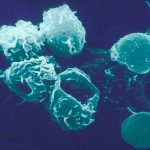Lien vers Pubmed [PMID] – 1827484
J. Immunol. 1991 May;146(10):3444-51
Murine IL-10 (cytokine synthesis inhibitory factor) inhibits cytokine production by Th1 cell clones when they are activated under conditions requiring the presence of APC. By preincubating APC with IL-10, we demonstrate that IL-10 acts principally on APC to inhibit IFN-gamma production by Th1 clones. Moreover, IL-10 is not active when Th1 cells are stimulated with glutaraldehyde-fixed APC, which also indicates that its action involves regulation of APC function. Furthermore, IL-10 inhibits cytokine synthesis by Th1 cells stimulated with the super-antigen Staphylococcus enterotoxin B, which does not appear to require processing. Flow microfluorimetry purified splenic or peritoneal B cells and macrophages, and B cell and macrophage cell lines can present Ag to Th1 clones. However, IL-10 acts only on sorted macrophages and the macrophage cell line to suppress IFN-gamma production by Th1 clones. IL-10 does not show this effect when B cells are used as APC. In contrast, IL-10 does not impair the ability of APC to stimulate cytokine production by Th2 cells. IL-10 does not decrease IFN-gamma-induced I-Ad levels on a macrophage cell line. Inasmuch as IL-10 also inhibits IL-2-induced IFN-gamma production by Th1 cells in an Ag-free system requiring only the presence of accessory cells, these data suggest that IL-10 may inhibit macrophage accessory cell function which is independent of TCR-class II MHC interactions.

